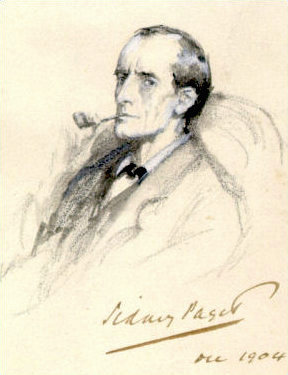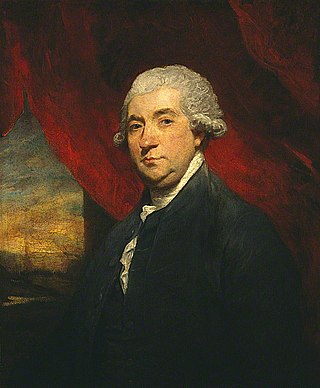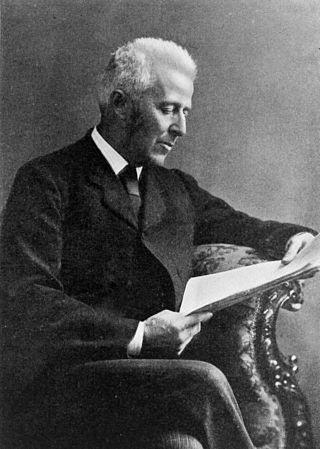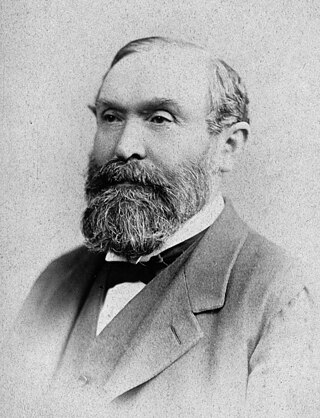
Sherlock Holmes is a fictional detective created by British author Arthur Conan Doyle. Referring to himself as a "consulting detective" in the stories, Holmes is known for his proficiency with observation, deduction, forensic science and logical reasoning that borders on the fantastic, which he employs when investigating cases for a wide variety of clients, including Scotland Yard.

James Boswell, 9th Laird of Auchinleck, was a Scottish biographer, diarist, and lawyer, born in Edinburgh. He is best known for his biography of his friend and older contemporary, the English writer Samuel Johnson, which is commonly said to be the greatest biography written in the English language. A great mass of Boswell's diaries, letters, and private papers were recovered from the 1920s to the 1950s, and their ongoing publication by Yale University has transformed his reputation.

Joseph Bell FRCSE was a Scottish surgeon and lecturer at the medical school of the University of Edinburgh in the 19th century. He is best known as an inspiration for the literary character, Sherlock Holmes.

The Valley of Fear is the fourth and final Sherlock Holmes novel by British writer Arthur Conan Doyle. It is loosely based on the Molly Maguires and Pinkerton agent James McParland. The story was first published in the Strand Magazine between September 1914 and May 1915. The first book edition was copyrighted in 1914, and it was first published by George H. Doran Company in New York on 27 February 1915, and illustrated by Arthur I. Keller.
Peter Trudgill, FBA is an English sociolinguist, academic and author.
Linguistic purism in English is the opposition to foreign influence in the English language. English has evolved with a great deal of borrowing from other languages, especially Old French, since the Norman conquest of England, and some of its native vocabulary and grammar have been supplanted by features of Latinate and Greek origin. Efforts to remove or consider the removal of foreign terms in English are often known as Anglish, a term coined by author and humorist Paul Jennings in 1966.
Steven Kevin Connor, FBA is a British literary scholar. Since 2012, he has been the Grace 2 Professor of English in the University of Cambridge and a Fellow of Peterhouse, Cambridge. He was formerly the academic director of the London Consortium and professor of modern literature and theory at Birkbeck, University of London.

Peter Hume Brown, FBA was a Scottish historian and professor who played an important part in establishing Scottish history as a significant academic discipline. In addition to teaching and writing, he spent 16 years as editor of the Register of the Privy Council of Scotland, and served as Historiographer Royal.
Derek Attridge FBA is a South African-born British academic in the field of English literature. He is Emeritus Professor of English and Related Literature at the University of York, having retired from the university in 2016, and is a Fellow of the British Academy. Attridge undertakes research in South African literature, James Joyce, modern fiction, deconstruction and literary theory and the history and performance of poetry. He is the author or editor of thirty books, and has published eighty articles in essay collections and a similar number in journals. He has held a Guggenheim Fellowship and a Leverhulme Research Professorship, and Fellowships at the National Humanities Center, the Bogliasco Foundation, the Camargo Foundation, and The Stellenbosch Institute for Advanced Study, the Freiburg Institute for Advanced Studies, and All Souls and St. Catherine's Colleges, Oxford. Among the visiting positions he has held have been professorships at the American University of Cairo, the University of Sassari, the University of Cape Town, Northwestern University, Wellesley College, and the University of Queensland.

Sir Arthur Ignatius Conan Doyle was a British writer and physician. He created the character Sherlock Holmes in 1887 for A Study in Scarlet, the first of four novels and fifty-six short stories about Holmes and Dr. Watson. The Sherlock Holmes stories are milestones in the field of crime fiction.

"Lot No. 249" is a Gothic horror short story by British writer Arthur Conan Doyle, first published in Harper's Magazine in 1892. The story tells of a University of Oxford athlete named Abercrombie Smith who notices a strange series of events surrounding Edward Bellingham, an Egyptology student who owns many ancient Egyptian artefacts, including a mummy. After seeing his mummy disappear and reappear, and two instances of Bellingham's enemies being attacked, Smith concludes that Bellingham is re-animating his mummy. Smith confronts Bellingham, who denies this is the case; the next day, Smith is attacked by the mummy and escapes. Smith then forces Bellingham to destroy his mummy and the associated artefacts at gunpoint.
Richard Curle (1883–1968) was a Scottish author, critic, and journalist. He was a friend of the novelist Joseph Conrad, who was also the subject of several of his critical works.

Arthur Conan Doyle KStJ, DL (1859–1930) was a Scottish writer and physician. In addition to the series of stories chronicling the activities of Sherlock Holmes and his friend Dr John Watson for which he is well known, Doyle wrote on a wide range of topics, both fictional and non-fictional. In 1876 Doyle entered the University of Edinburgh Medical School, where he became a pupil of Joseph Bell, whose deductive processes impressed his pupil so much that the teacher became the chief model for Holmes. Doyle began writing while still a student, and in October 1879 he had his first work—"The Mystery of the Sasassa Valley"—published in Chambers's Journal. He continued writing short works—both fictional and non-fictional—throughout his career, and had over 200 stories and articles published.

William Rutherford was a Scottish physician and physiologist. For 25 years he was professor of physiology at the University of Edinburgh, and contributed to the development of experimental physiology. He was Fullerian Professor of Physiology and Comparative Anatomy from 1872 to 1875.

Arthur J. Raffles is a fictional character created in 1898 by E. W. Hornung, brother-in-law of Sir Arthur Conan Doyle, the creator of Sherlock Holmes. Raffles is, in many ways, an inversion of Holmes – he is a "gentleman thief", living at the Albany, a prestigious address in London, playing cricket as a gentleman for the Gentlemen of England and supporting himself by carrying out ingenious burglaries. He is called the "Amateur Cracksman" and often, at first, differentiates between him and the "professors" – professional criminals from the lower classes.

Sir Peter William Mathieson is an English nephrologist and current principal and vice-chancellor of the University of Edinburgh. Previously, he served as the vice-chancellor and president of the University of Hong Kong (HKU). He was the dean of the Faculty of Medicine and Dentistry of the University of Bristol before he assumed office at the HKU in April 2014, and was previously director of studies at Christ's College, Cambridge.
Tom McArthur was a Scottish linguist, lexicographer, and the founding editor of English Today. Among the many books he wrote and edited, he is best known for the Longman Lexicon of Contemporary English, the first thematic monolingual learner's dictionary, which complemented the Longman Dictionary of Contemporary English by bringing together sets of words with related meanings, Worlds of Reference, as well as the Oxford Guide to World English.
Jane Setter is a British phonetician. She teaches at the University of Reading, where she is Professor of Phonetics. She is best known for work on the pronunciation of British and Hong Kong English, and on speech prosody in atypical populations.
Brice Stratford is an English director, writer, and actor-manager. He has focused on classical theatre, the New Forest area of Southern England, and British folklore and mythology. He founded the Owle Schreame theatre company, which focused on Renaissance plays. He has written two books on British mythology.
"The King of the Foxes" is a short story by Arthur Conan Doyle, first published in the United Kingdom in July 1898 in The Windsor Magazine, and in the United States in August 1898 in Ainslee's Magazine. While it is not a Sherlock Holmes story, it is recognized by scholars as a forebear of The Hound of the Baskervilles, both for its gothic themes in general and its treatment of a supernaturally terrifying animal in particular.












